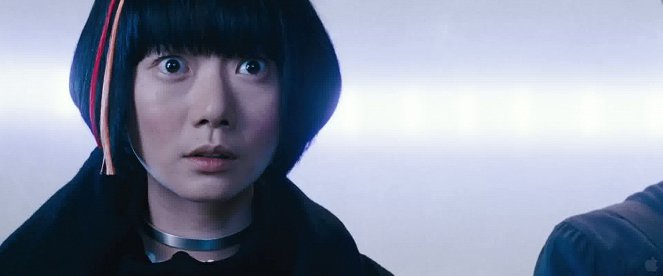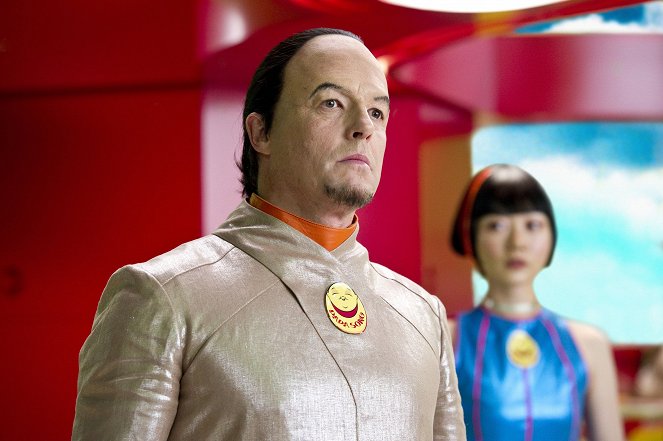Acteurs·trices:
Tom Hanks, Halle Berry, Jim Broadbent, Hugo Weaving, Jim Sturgess, Doo-na Bae, Ben Whishaw, Keith David, James D'Arcy, Xun Zhou, David Gyasi (plus)VOD (3)
Résumés(1)
À travers une histoire qui se déroule sur cinq siècles dans plusieurs espaces temps, des êtres se croisent et se retrouvent d'une vie à l'autre, naissant et renaissant successivement... Tandis que leurs décisions ont des conséquences sur leur parcours, dans le passé, le présent et l'avenir lointain, un tueur devient un héros et un seul acte de générosité suffit à entraîner des répercussions pendant plusieurs siècles et à provoquer une révolution. Tout, absolument tout, est lié. (Warner Bros. FR)
(plus)Vidéo (36)
Critiques (18)
Ma frustration initiale face aux sauts constants entre les histoires (parfois au bout de seulement quelques secondes) et au mélange d'éléments de genre incompatibles, où des costumes d'Amistad et de Star Trek se côtoient, s'est progressivement transformée en émerveillement devant une œuvre que l'on pourrait qualifier d'extraordinaire. Narrativement complexe, spirituellement profonde, cinématographiquement innovante, audacieuse quant à sa production. Dans un flot de pensées sur la vie et les souffrances intemporelles de l'humanité, présentées dans une poétique de conte de fées, des chiens sont abattus, des gorges tranchées et des orteils sucés. Et des femmes jouent des hommes et des hommes jouent des femmes. Un océan spectaculaire de moments d'émotion époustouflants qui ne peuvent être absorbés dans tous leurs contextes au premier visionnage. Halle Berry est magnifique et Hugo Weaving, démoniaque. Les investisseurs ont pris un grand risque. Ma note n’est que préliminaire, parce que ce film nécessite deux ou trois visionnages.
()
Alors que la structure narrative du livre « Cloud Atlas » ressemble plutôt au démontage et à l'assemblage d'une poupée russe, dans le film, les différentes lignes narratives sont entrelacées et racontées simultanément, de sorte qu'elles ne culminent pas graduellement mais toutes en même temps. Grâce à un montage fantastique, passant d'un moyen mnémotechnique à un autre, les dialogues, les différents détails et similitudes, ainsi qu'à la réalisation et à la direction très maîtrisées, toutes les histoires peuvent atteindre un point culminant aux mêmes endroits et donner l'impression d'un ensemble complexe, sans pour autant tomber dans la confusion et le chaos. Cette œuvre ambitieuse et audacieuse ressemble à une adaptation de six livres à la fois, combinant l'aventure historique en mer, le drame d'époque, le thriller d'espionnage, la comédie enjouée, la science-fiction dystopique, ainsi qu'un mythe postapocalyptique et le thème central de la réincarnation et de l'interdépendance des personnages est souligné par l'utilisation de masques ingénieux et par le casting de chaque acteur et actrice dans une demi-douzaine de rôles, indépendamment du sexe, de la nationalité ou de la couleur de peau. La collaboration entre les Wachowski et Tom Tykwer était apparemment un aspect clé pour que le film puisse fonctionner dans tous les styles et avoir une impression d'unité. Une superbe production, une musique exceptionnelle, une forme cinématographique révolutionnaire et inégalée, une réflexion à plusieurs niveaux, un travail interconnecté avec les motifs et les thèmes, l'une des meilleures adaptations de livre jamais réalisées.
()
It’s remarkable that the seams that connect the different stories in different time and space are so imperceptible that the film flows smoothly and the three hours are not even noticeable. Unfortunately, it results in something that has neither sufficient emotional nor cathartic effect. In other words, there is no profound experience, and by the end I felt a bit....empty. Anyway, I appreciate the courage to come up with something so non-commercial and non-subversive in this day and age, when A-film production resembles a controlled process to make money.
()
SIX IN ONE. I didn’t want to write an overly celebratory comment right after leaving the cinema, and I decided to let the experience brew for a day, and the result? I’m still so excited! Cloud Atlas is the best film in at least a couple of years, but also a category on its own that can not be properly compared with any other. Amazing! I can’t understand how the Wachowskis and Tykwer managed to simultaneously tell six mostly conversational stories with different styles and genres (historical drama, tragic romance, journalist investigation, black comedy, dystopian sci-fi, and post-apocalyptic sci-fi) in a way that the whole lot sticks together (actually, Cloud Atlas can’t be seen in any other way than as a whole), and where everything is clear and running smoothly, and on top of that, its three hour run feels like an action ride, instead of a confusing and dry arthouse flick. Its message may not be revolutionary or original, but who cares in this case? Or do we now expect every film to come out with its own ontological system? In any case, the ending is very effective, it brings together the climax of six stores – it’s about half an hour long (six times five minutes). Half an hour of goosebumps :) … In short, the Wachowskis and Tykwer met the expectations I had set for them (which this year Scott and Nolan couldn’t do), and at the same time they were able to surprise me with how quickly the film goes (some ninety minute films feel longer than this three hour monument), and mainly because it’s a lot more viewer-friendly than I expected. The attentive viewer won’t get lost and the receptive viewer will absorb, they only need to go a little against the flow. But more viewings will of course be necessary for even better details, and I’m already looking forward to them. 100 %
()
Cloud Atlas is definitely a stimulating film, but I’m not sure what the directors’ primary intention was. I most enjoyed seeing how the all-encompassing favouritism towards minorities is related to the conventions of individual genres. Melodrama from the artistic environment was ascribed to homosexual romance, the main protagonists of an originally white paranoid thriller are a black female reporter and her partner, who were seemingly pulled out of a blaxploitation action flick. None of the genres employed in the film is entirely “pure” – the comedy is permeated with an escape movie, the thriller makes room for black humour – as the filmmakers acknowledge their own post-modern framing of the book on which the film is based, i.e. a point of view that doesn’t belong to any of the characters. Cloud Atlas is fine in its analysis of post-modern genre deconstructions, but it fails on a more basic level. I found the flat characters to be uninteresting. Contemplating who was hidden behind the mask was more entertaining to me than the acting. The six worlds are equally artificial, intended only for conveying certain transpersonal ideas. They are worlds for the camera, without a life of their own. So that we don’t doubt that one of the levels plays out in the 1970s, almost every exterior shot includes a car typical of the era (e.g. a Ford Mustang). The film fails to grip the viewer or offer a concentrated emotional experience. Taken together, the actions set in different time-space continua do not form a powerful sequence; on the contrary, they get in each other’s way and make it impossible for individual scenes to resonate. If the intention was to make it difficult for viewers to deal with the fact that the stories are fragmented and in no way interconnected, what need is there for the constant creation of banal thematic and graphic (and, to a lesser extent, symbolic) parallels? At least the similarity of the stories shouldn’t be so obvious and constantly emphasised through the off-screen commentary by one of the many narrators. Insufficient use of the fact that most of the stories are told by someone, in the form of a diary, a letter or a book, from the position of an interrogated prisoner or a respectable elder, represents another promise that the film makes and yet fails to develop (we only hear the narrators’ voices; otherwise, they remain unseen and do not actively get involved in the narrative, nor are they ever interrupted as it unfolds). Whatever the artistic intention may have been, which is not made very clear at all by the commercial rendering of the whole project, Cloud Atlas seemed to me like constantly interrupted intercourse without a proper climax. In exchange for the attention that I invested, and which had nothing to fixate on in places, I expected a more valuable reward than a message along the lines of “we have to help each other”, which I found to be ridiculous coming from a film that wants to break down conventions. 70%
()



Annonces